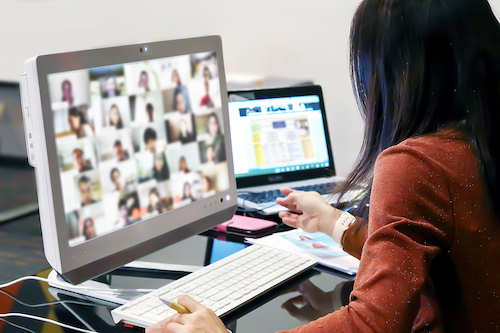 You sit down in front of your computer screen and dial in to yet another video conference. The content of the meeting isn’t all that different from if you had gathered with your colleagues in person, but after back to back video calls, you’re exhausted.
You sit down in front of your computer screen and dial in to yet another video conference. The content of the meeting isn’t all that different from if you had gathered with your colleagues in person, but after back to back video calls, you’re exhausted.
You’re not alone. Research published in the Journal of Applied Psychology found that more than 90 percent of employees reported feeling tired after a videoconference.
“Feeling tired after these videoconferences is a real thing. If you've experienced this, you aren't alone and you aren't imagining it. We now have some robust scientific data to back up this phenomenon: Over 92% of participants in this study recognized feeling fatigued and tired after a videoconference,” Andrew Bennett, PhD, lead author of the study and an assistant professor at Old Dominion University.
Bennett and colleagues were compelled to study the phenomenon of video conference fatigue after experiencing it themselves.
“We felt this fatigue that was happening by being on videoconferences. Our research team was on a videoconference in March 2020 right after we all started working from home and transitioned to teaching and learning online in the US - and at the end of the meeting, we discussed how exhausting it was,” he told Theravive.
“We decided to investigate further to understand what might cause videoconference fatigue and what people can do to feel less fatigued after videoconferences.”
In undertaking the research, Bennett and colleagues enlisted participants to participate in nine hourly surveys every work day for five consecutive work days during 2020.
Participants completed more than 1700 surveys and on average participated in five to six videoconferences across the working week. 58 percent of participants were male. 73 percent of the participants were white and the average age of participants was 33.
Participants who took the surveys shared comments that suggested videoconferences were mentally taxing and took a toll on the mind and spirit. Others expressed that they were tired of video conferencing. Just seven percent didn’t report signs of zoom fatigue.
Bennett and his team had anticipated that watching other people’s faces on a screen, or watching one’s own face on a screen would contribute to zoom fatigue, but this wasn’t the case.
The researchers found that being able to see one’s own face or turning the webcam off made no notable difference to fatigue following a videoconference call. But participants did have mixed feelings about the use of webcams.
Some respondents reported that it felt exhausting always having to be looking at the screen and others said it felt impersonal if a colleague switched off their webcam during a meeting.
Problems with meeting etiquette were also reported by participants. One noted that it seemed that on a videoconference call, everyone just wants to log on, have the meeting and log off quickly. They noted there was little room for small talk and chat before or after the zoom meeting, as there often would be in real life.
The researchers believe that such chatter and small talk would help to build a sense of belonging within a group, and without it, video conference participants might feel more fatigued. If a participant felt a greater sense of belonging, they had less fatigue.
“A sense of belonging is always important, but it seems that in a virtual environment, especially if someone isn't used to remote work, it may be more difficult to connect with others, which is why we saw that fatigue was much lower after individuals felt a high sense of belonging in a videoconference,” Bennett told Theravive.
The researchers identified a number of measures that could be taken to combat zoom fatigue.
“There were three things we found that helped people feel less fatigued after videoconferences. First, have meetings at the right time of the day. In this study, everyone worked 9-to-5 type jobs and, before they worked from home, they had been in an office setting. For these individuals, a videoconference in the middle of the day was fine, but later in the afternoon people were much more fatigued than normal after a videoconference,” Bennett said.
“Second, use mute when you aren't speaking. It seems so simple, but we think just reducing distractions for other people is helpful here. Third, and this was the strongest finding, is that feeling part of the group really matters. When these employees had a high sense of belongingness with others on the meeting, they were much less fatigued afterwards.”
He suggests employees and employers could foster a sense of belonging by including time for small talk before and after meetings or offering break out rooms on zoom calls where employees could talk about hobbies and interests.
Establishing some simple meeting rules regarding whether or not to use webcams may also be useful.
Elizabeth Pratt is a medical journalist and producer. Her work has appeared on Healthline, The Huffington Post, Fox News, The Australian Broadcasting Corporation, The Sydney Morning Herald, News.com.au, Escape, The Cusp and Skyscanner. You can read more of her articles here. Or learn more about Elizabeth and contact her via her LinkedIn and Twitter profiles.